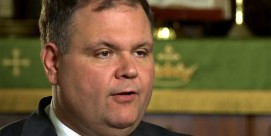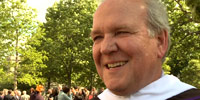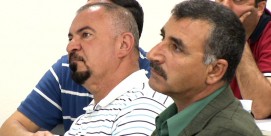In This Episode << SLIDE LEFT TO SEE ADDITIONAL SEGMENTS
Religion and the Second Term Commentary
Read comments from two scholars on the moral arguments and religious themes that were all part of the recent American civic liturgy — the Inaugural Address, the State of the Union Address, and the National Prayer Breakfast:
Joel Carpenter is provost and professor of history at Calvin College:
President Bush’s references at the National Prayer Breakfast to the role of prayer in times of national need echoed countless others down through the years; American presidents have frequently reminded the nation of the protecting hand of divine providence.
What is striking about President Bush’s characterizations, however, is the emphasis on religious action in the realm of relief, development, and human rights. He appeared to be speaking of a realm that is very familiar to him, the networks of charitable action that religious Americans and their congregations support. The president is not dealing in glittering generalities here, but with specific organizations and issues. He knows the work and appreciates it greatly.
Even so, he is making a political point: judge America by this outpouring of nongovernmental religious compassion, not so much by its government’s actions to stem want and disasters, man-made or natural. His concrete case of someone who suffered in war-torn Liberia and was helped by an American Christian social service agency was telling. It was an act of mercy to treat the suffering, but it was not deemed in America’s interest to intervene to stop the war.
A very modest American intervention in this nation, which was virtually an American colony, could have prevented much of the suffering. But that would need to be a governmental initiative. Mr. Bush is saying very vividly that the cause of freedom he so ardently proclaimed in his inaugural as American foreign policy does not apply in Liberia.
Steven M. Tipton is professor of the sociology of religion at Emory University:
God works in remarkable ways in the second Inaugural Address of President George W. Bush, especially in justifying America’s forceful defense of freedom around the world today, particularly (if implicitly) in Iraq, where the United States is fulfilling the providential flow of history in the direction “set by liberty and the author of liberty.”
That divine author, echoing Thomas Jefferson’s “laws of Nature and of Nature’s God” in the Declaration of Independence and linked to the “imago Dei,” is the source of America’s founding faith in freedom: “From the day of our founding, we have proclaimed that every man and woman on this earth has rights, and dignity, and matchless value, because they bear the image of the maker of heaven and earth.”
That divine author is the guarantor of freedom’s eventual triumph for all humankind and our complete confidence in our cause as its carrier. Not because “history runs on the wheels of inevitability. It is human choices that move events. Not because we consider ourselves a chosen nation. God moves and chooses as he wills,” but because we have chosen to do God’s will in advancing the cause of God-given freedom; we are an almost-chosen nation that can be confident in following our leaders along this course with God and history on our side.
Four years ago President Bush expressed confidence in keeping his solemn pledge “to build a single nation of justice and opportunity” because “we are guided by a power larger than ourselves who created us equal in His image.” He pointed out a providential angel who “rides in the whirlwind and directs this storm” through history to advance “the nation’s grand story of courage” and its “simple dream of dignity,” whose author “fills time and eternity with his purpose.” Then providence pointed out our duty to serve one another along the Good Samaritan’s path of compassionate conservatism, with just a brief aside from Mr. Bush to the enemies of liberty and our country that we would remain “engaged in the world by history and by choice, shaping a balance of power that favors freedom.”
Now providence has permitted a terrible “day of fire” to jolt us from repose after the Cold War to defend liberty in our own land by spreading it in other lands. Now our vital interests and our deepest beliefs are fused into a single struggle to decide the “moral choice between oppression, which is always wrong, and freedom, which is eternally right.”
Drawing on his speeches after 9/11, with their contrast between freedom and fear, and modulating their promise to rid the world of evil from a focus on terror to tyranny, President Bush commits the U.S. to supporting worldwide democracy “with the ultimate goal of ending tyranny in the world.” Compared to the 2001 Inaugural Address, compassion comes in for mention only in passing, with a plea to “look after a neighbor and surround the lost with love,” lest liberty for all within an ownership society come to mean independence from one another. The transformation of domestic policy, from sustaining Social Security to building free-market ownership in order to make “every citizen an agent of his or her own destiny,” remains as brief in elaboration as it is sweeping in conception.
The moral lessons the speech spells out are those of “duty and allegiance” evident in the determined faces of our soldiers. Having seen that “life is fragile, and evil is real, and courage triumphs,” we must choose to “serve in a cause larger than your wants, larger than yourself” in order to add to the character of our country, not just its wealth.
The self-sacrifice Bush urged in 2001 to serve a needy neighbor is now turned to sterner tasks. His earlier insistence that our public interest depends on private character now shifts from self-giving to self-discipline. “Self-government relies, in the end, on the governing of the self. That edifice of character is built in families, supported by communities with standards, and sustained in our national life by the truths of Sinai, the Sermon on the Mount, the word of the Qur’an, and the varied faiths of our people.” Rooted in religious faith, timeless and true moral ideals build moral character and sustain democratic progress in America and around the world. The speech is indeed a call to march in a moral crusade identified with the cause of freedom given by God and defining the providential course of history. Whether that means supporting or opposing the policies of the Bush administration at home and abroad, conscientious citizens and their elected representatives in Congress must now debate and decide.







